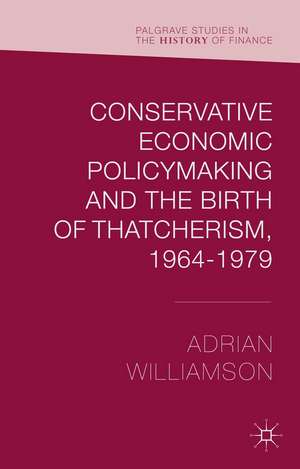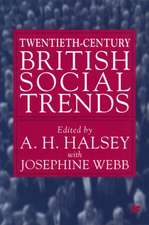Conservative Economic Policymaking and the Birth of Thatcherism, 1964-1979: Palgrave Studies in the History of Finance
Autor Adrian Williamsonen Limba Engleză Hardback – 17 feb 2015
Din seria Palgrave Studies in the History of Finance
-
 Preț: 362.11 lei
Preț: 362.11 lei - 9%
 Preț: 626.30 lei
Preț: 626.30 lei - 18%
 Preț: 737.26 lei
Preț: 737.26 lei - 15%
 Preț: 522.89 lei
Preț: 522.89 lei -
 Preț: 451.65 lei
Preț: 451.65 lei - 15%
 Preț: 701.06 lei
Preț: 701.06 lei - 18%
 Preț: 726.37 lei
Preț: 726.37 lei - 15%
 Preț: 712.22 lei
Preț: 712.22 lei - 15%
 Preț: 530.25 lei
Preț: 530.25 lei - 18%
 Preț: 1114.21 lei
Preț: 1114.21 lei - 18%
 Preț: 1006.55 lei
Preț: 1006.55 lei - 18%
 Preț: 726.06 lei
Preț: 726.06 lei - 18%
 Preț: 786.84 lei
Preț: 786.84 lei - 18%
 Preț: 792.03 lei
Preț: 792.03 lei - 18%
 Preț: 724.94 lei
Preț: 724.94 lei - 15%
 Preț: 702.54 lei
Preț: 702.54 lei - 18%
 Preț: 723.69 lei
Preț: 723.69 lei -
 Preț: 388.72 lei
Preț: 388.72 lei - 15%
 Preț: 694.19 lei
Preț: 694.19 lei - 18%
 Preț: 782.72 lei
Preț: 782.72 lei - 15%
 Preț: 637.59 lei
Preț: 637.59 lei - 18%
 Preț: 1108.51 lei
Preț: 1108.51 lei - 9%
 Preț: 920.31 lei
Preț: 920.31 lei - 15%
 Preț: 711.89 lei
Preț: 711.89 lei -
 Preț: 383.12 lei
Preț: 383.12 lei - 18%
 Preț: 891.33 lei
Preț: 891.33 lei - 18%
 Preț: 958.25 lei
Preț: 958.25 lei - 18%
 Preț: 1008.28 lei
Preț: 1008.28 lei -
 Preț: 445.88 lei
Preț: 445.88 lei - 18%
 Preț: 1113.58 lei
Preț: 1113.58 lei - 15%
 Preț: 646.75 lei
Preț: 646.75 lei - 15%
 Preț: 702.05 lei
Preț: 702.05 lei -
 Preț: 450.11 lei
Preț: 450.11 lei - 18%
 Preț: 794.39 lei
Preț: 794.39 lei - 18%
 Preț: 948.29 lei
Preț: 948.29 lei - 15%
 Preț: 697.97 lei
Preț: 697.97 lei - 18%
 Preț: 728.74 lei
Preț: 728.74 lei
Preț: 764.94 lei
Preț vechi: 840.59 lei
-9% Nou
Puncte Express: 1147
Preț estimativ în valută:
146.42€ • 159.10$ • 123.07£
146.42€ • 159.10$ • 123.07£
Carte disponibilă
Livrare economică 31 martie-14 aprilie
Livrare express 15-21 martie pentru 36.04 lei
Preluare comenzi: 021 569.72.76
Specificații
ISBN-13: 9781137460257
ISBN-10: 1137460253
Pagini: 378
Ilustrații: XVII, 378 p.
Dimensiuni: 140 x 216 x 22 mm
Greutate: 0.61 kg
Ediția:2015
Editura: Palgrave Macmillan UK
Colecția Palgrave Macmillan
Seria Palgrave Studies in the History of Finance
Locul publicării:London, United Kingdom
ISBN-10: 1137460253
Pagini: 378
Ilustrații: XVII, 378 p.
Dimensiuni: 140 x 216 x 22 mm
Greutate: 0.61 kg
Ediția:2015
Editura: Palgrave Macmillan UK
Colecția Palgrave Macmillan
Seria Palgrave Studies in the History of Finance
Locul publicării:London, United Kingdom
Cuprins
Preface And Acknowledgements List Of Tables And Figures List Of Abbreviations About The Author 1. Introduction The Historiographical Context Methodology And Approach The Argument And Structure Of This Book 2. Policymaking: Structures, Ideas And Influences Introduction The Conservative Economic Inheritance Policymaking 1964-1970 How, Who And What? The Powellite Challenge 1970-1974: Crisis In Government How Who And What? Party Dissent Keynesian Loss Of Faith? 1974-9: Conservative Reappraisal Capture By The Think-Thanks? Reconsideration The Battle Of Ideas 3. Tax And Spend: Towards A Smaller State? Introduction Taxation Reform And Pacemakers, 1964-1974 The Outside World: Debating Tax In The 1970s The Conservatives And Tax, 1974-1979 Public Spending Less Is More: 1964 To 1971 1971 To 1974: Pump Priming The 1970s Spending Crisis The Conservatives And Spending, 1974-1979 A New Frontier? Less Welfare? Building Wealth? North Sea Oil To The Rescue? Conclusions 4. From Prices And Incomes PolicyTo Sado-Monetarism? Introduction Planning Prices And Incomes 1964-1971: Tory Indecision Was Final Statutory Restraint: Conservative Policy 1972-1974 Towards Prices And Incomes Policy The Importance Of Money The Debate About Inflation Labour In Power 1974-79: Tory Rethink On Prices And Incomes Policy The Social Contract Conservative Discussions On Prices And Incomes Policy Price And Dividend Control Were The Conservatives Theoretical Monetarists? Conclusions 5. Conservative Industrial Policy: The End Of The Mixed Economy? Introduction Industry And The State Industry, The State And Politics The Industrial Problem And Proposed Solutions Post-War Industrial Policy The Conservatives And The Nationalised Industries Policymaking 1964-1970 The Conservative Government 1970-1974: Confusion Confounded? The Nationalised Industries 1974-1979: The Origins Of Privatisation? The Conservatives And Industrial Decline 1964-1970 Lame Ducks: 1970-1974 Lame Ducks To The Slaughter 1974-1979? A Positive Policy For Industry? 1964-1970 Interventionism And The 1972 Act Policymaking 1974-1979: Trusting The Market And The Wider Debate Conclusions 6.Trade Unions: The Discipline Of Law? Introduction 239 The (Strong) Position Of The Unions Before 1979 The Trade Unions: Strengths And Weaknesses The Intellectual Context Bringing The State In: 1964-1974 Towards The Act: 1964-1971 The 1971 Act Fails: 1971-1974 Rethinking Policy, 1975-1979 Official Policymaking Other Voices Stepping Stones Conclusions 7.Britain's Role In The World Economy Introduction The Conservatives And Europe 1961-75: Getting In 1975-1979: Digging In Sterling, Trade And The Balance Of Payments Phase One: Defending Sterling, 1964-1971 Phase Two: Floating, Sinking And The Aes, 1972-1976 Phase Three: Let The Pound Rise, 1976- Monetarism In One Country? Flows Of Oil And Capital The European Monetary System Flows Of People: Immigration Conclusions 8. Conclusion Concluding Thoughts Further Work The 1950s Revisited The Thatcher Governments 1979-1990 (And To 2015?) What About The Voters? Thatcherism Now Notes Bibliography And Other Sources
Recenzii
“This wide-ranging coverage of Conservative economic policymaking is based on a broad and impressive array of primary sources. … This book is an essential contribution to the incipient historical debate on the Thatcher governments, which challenges the assumption that Thatcherism existed as a novel and coherent political-economic project prior to 1979. Furthermore, it provides a solid foundation for future research into the development of the Conservative party’s radical approach to economic policymaking in government during the 1980s.” (Aled Davies, Twentieth Century British History, Vol. 28 (1), March, 2017)
Notă biografică
Adrian Williamson studied History and Law at Trinity Hall, Cambridge, and was called to the Bar in 1983. He has practised at Keating Chambers since 1989, taking silk in 2002. The papers he has delivered include 'The Conservatives and 'Concerted Action': Economic Policy making 1975–1979' in 2010 and ''Reversing the Trend': Keith Joseph and the remaking of British Conservatism, 1974–1979' in 2011.
















